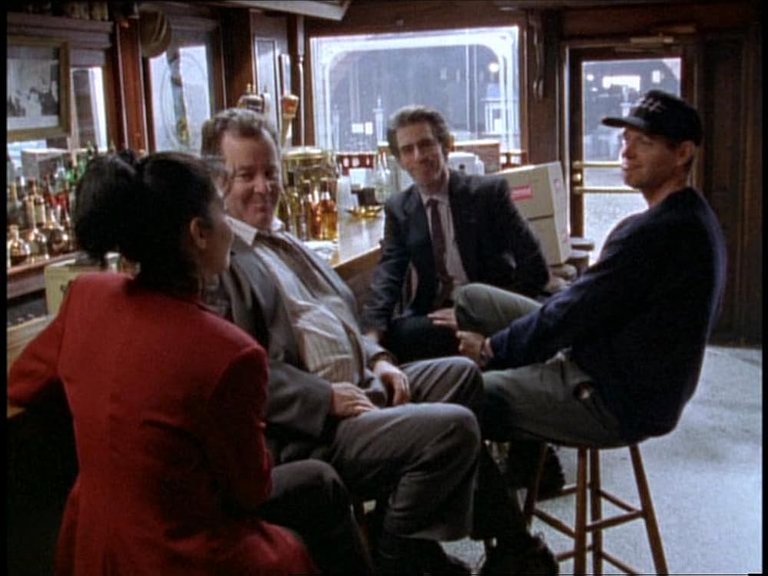Television Review: Pit Bull Sessions (Homicide: Life on the Street, S6X15, 1998)

Pit Bull Sessions (S06E15)
Airdate: 13 March 1998
Written by: Sean Whitesell
Directed by: Barbara Kopple
Running Time: 45 minutes
Homicide: Life on the Street, in its final two seasons, succumbed to the networks’ relentless push for ratings-driven content, trading its gritty urban realism and sharp socio-political commentary for melodrama, sensationalism, and contrived spectacle. This shift diluted the show’s signature “edge,” as writing quality waned in favour of episodic filler and formulaic plotting. Yet, paradoxically, the decline in narrative ambition was offset by an elevation in acting prowess. By this stage, the series had become a magnet for seasoned performers and rising stars seeking a platform to showcase nuanced, understated power. Pit Bull Sessions, a standout example of this duality, encapsulates both the erosion of Homicide’s original ethos and the enduring brilliance of its ensemble cast.
The episode’s main narrative centres on the gruesome death of elderly retiree Tsjark, found mauled to death by pit bulls in his Baltimore home. Detectives Pembleton and Falsone investigate, quickly homing in on Tsjark’s estranged grandson, Harry (Paul Giamatti), a 35-year-old underachiever who had been disowned by his father and forced to live with his grandfather—a relationship fraught with mutual resentment. Harry’s passive indifference to his grandfather’s fate is unsettling, yet proving intent is a labyrinthine process. Falsone, ever the master manipulator, exploits Harry’s latent affection for the dogs—threatening euthanasia and forcing a confession.
A secondary plot unfolds at the Waterfront Bar, where Bayliss, joined by Munch, Gharty, and Ballard, regales one another with tales of recent cases. The camaraderie here feels like a “clip show” repurposed for the episode, though the stories—rife with dark humour and grim reflections on human folly—are woven into the narrative seamlessly. Gharty’s anecdote, in particular, about a child wanting to visit the scene of his father’s murder, resonates with Homicide’s core themes of the impact of violence on ordinary people. Yet the scene is disrupted by the presence of Tony (Tony Fitzpatrick), a bar employee scribbling notes while reading the Bible. His mysterious demeanour injects unease, though the subplot feels underdeveloped, a missed opportunity to explore deeper intrigue rather than a fleeting distraction.
The episode also advances the prolonged Luther Mahoney saga, wherein Kellerman uncovers a glaring conflict of interest: the judge presiding over the wrongful death lawsuit filed by Luther’s sister, Georgina Rae, had previously released her from jail. Kellerman’s suspicion of judicial corruption is palpable, but the revelation feels tacked-on, an artificial extension of an already overstretched arc.
Like many later Homicide episodes, Pit Bull Sessions suffers from tonal dissonance and fractured focus. The Mahoney subplot, in particular, grinds the narrative to a halt with its contrived theatrics, while the bar scene—though nostalgic and occasionally poignant—struggles to justify its inclusion. The inclusion of Tony, whose significance remains unexplored, further dilutes the episode’s momentum, feeling more like a half-baked red herring than a meaningful thread.
Conversely, the pit bull storyline shines as the episode’s centrepiece. It hews closely to Homicide’s original mandate: unflinchingly examining the mundane cruelty of crime and the flawed humanity of its perpetrators. Giamatti’s performance is masterful, distilling Harry’s emotional vacuity into a chilling portrait of a man who weaponises his own insignificance. The scene where Falsone manipulates Harry through appeals to his latent guilt over the dogs is particularly potent, a testament to the actor’s ability to convey layers of suppressed emotion. For Giamatti, then at the cusp of his breakthrough into leading roles, the part serves as a microcosm of his talent—a chance to embody not just villainy, but the hollow, almost comically ordinary nature of evil.
The Waterfront Bar segment, while uneven, briefly recaptures the show’s earlier spirit. The interplay between the detectives evokes the ensemble’s chemistry from the series’ prime. Gharty’s story, in particular, underscores Homicide’s enduring strength: its ability to weave dark comedy with harrowing reality, finding absurdity in tragedy without diminishing its gravity. Yet the inclusion of Tony—a character whose purpose remains opaque—feels gratuitous, a misstep that distracts from the scene’s emotional core.
At the end of the day, Pit Bull Sessions is a fractured but fascinating relic of Homicide’s twilight years. While the episode’s reliance on soap-operatic twists and underdeveloped subplots betrays the show’s decline, it is elevated by standout performances like Giamatti’s and fleeting moments where the series’ original vision briefly rekindles. For all its flaws, the episode remains a testament to the enduring power of its ensemble and its capacity to transcend its own creative limitations.
RATING: 6/10 (++)
Blog in Croatian https://draxblog.com
Blog in English https://draxreview.wordpress.com/
InLeo blog https://inleo.io/@drax.leo
LeoDex: https://leodex.io/?ref=drax
Hiveonboard: https://hiveonboard.com?ref=drax
Rising Star game: https://www.risingstargame.com?referrer=drax
1Inch: https://1inch.exchange/#/r/0x83823d8CCB74F828148258BB4457642124b1328e
BTC donations: 1EWxiMiP6iiG9rger3NuUSd6HByaxQWafG
ETH donations: 0xB305F144323b99e6f8b1d66f5D7DE78B498C32A7
BCH donations: qpvxw0jax79lhmvlgcldkzpqanf03r9cjv8y6gtmk9